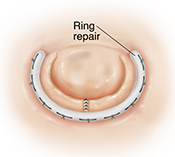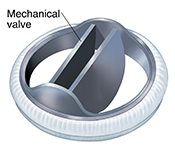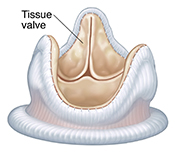Heart Valve Surgery
Once a valve problem has been diagnosed and surgery scheduled, you’ll have some things to do. Taking care of these things in advance will help make your surgery go smoothly. Some will help you get set up for your return home from the hospital. And others will help you feel more at ease. Your healthcare provider will talk with you about the risks. Write down all your questions in advance so you don’t forget to ask them.
The week before surgery
Steps you take before your surgery can help make both the surgery and recovery go smoothly. Follow your healthcare provider’s instructions.
-
-
Give your provider a list of every medicine you take. This includes over-the-counter and prescription medicines. It also includes vitamins, herbs, and supplements. Your provider may have you stop taking some of them. Or they may have you start taking others before surgery.
-
If you smoke, quit right away. You'll do better during and after surgery.
-
Arrange for an adult family member or friend to drive you home from the hospital. Have a helper available for 1 or 2 weeks while recovering at home.
-
Prepare and freeze food. Or arrange to have food delivered while you recover.
-
Make changes around your home to make it easier to get around. For instance, reduce the need to climb stairs.
-
Let your provider know about any planned dental work before or after your surgery. Dental work can cause an infection to the new valve by letting bacteria into your bloodstream. Antibiotics are often provided for dental procedures for people with heart valve concerns.
The day before surgery
-
You may be asked to wash with special soap the night before surgery. Don’t use any deodorant, lotion, or perfume the morning of surgery.
-
Follow all directions you're given for not eating or drinking before surgery.
During your surgery
-
Your surgeon will first gain access to your heart. To get to the heart, the surgeon usually makes a cut (incision) down the center of the chest. The breastbone (sternum) is then separated. If your surgeon plans to reach your heart by a different means, they'll discuss it with you in detail.
-
For certain types of valve repair or replacement, cardiac catheterization or balloon valvuloplasty may be advised. Your provider will discuss all choices with you.
-
A heart-lung machine will put oxygen in your blood. This is so your heart and lungs can be still during the surgery.
-
The surgeon will either fix or replace the problem valve. If you have another heart problem, the surgeon may do a second procedure at the same time to take care of it, too.
-
After surgery is done, the surgeon rejoins the breastbone with wires. The incision is then closed. In many cases, the breastbone heals in 6 to 8 weeks.
3 ways to treat problem valves
Different problems call for different treatments. Your healthcare provider will talk with you in advance about the treatment that's best for you. In some cases, though, the plan may need to change once surgery has begun. The 3 basic ways to treat valve problems during surgery are:
-
Repair the valve. Whenever they can, surgeons prefer to fix a valve rather than replace it. For the most common type of repair, a ring is sewn around the entrance to a valve to improve its size or shape. Another type is done by cutting tissue to let leaflets open or close better. When repair isn’t possible, the valve will be replaced.
-
Replacement with a mechanical valve. Mechanical valves are made of metal or hard carbon. There are many designs. Valves can last for decades. But blood tends to stick to them, forming clots. So if you get a mechanical valve, you have to take medicine to keep your blood thin to prevent blood clots..
-
Replacement with a tissue valve. A tissue valve usually comes from a pig or a cow. But it may also come from human tissue. Blood doesn't clot as easily on tissue valves. So people getting tissue valves may need to take a blood-thinner medicine for a short time. Aspirin is sometimes used instead. Tissue valves may wear out faster than mechanical valves, so they may have to be replaced sooner.



Recovering after surgery: In the hospital
You’ll spend at least 1 day in the intensive care unit (ICU) after surgery. Highly trained nurses will watch you closely. When you’re ready, you'll be moved to a general care room. You’ll stay there for 5 to 6 days. While there, you’ll recover further and get ready to go home.
Recovering after surgery: At home
You’ve just completed a major event in your life. So give yourself time to recover. Expect good days and bad days. At first you may feel tired easily. Being active will help you recover. Find the right balance between rest and activity. And follow all instructions you’re given.
Risks and possible complications of heart valve surgery
Most valve surgeries have an excellent outcome. But any major surgery carries risks. Valve surgery risks include:
-
Bleeding, or the need for a transfusion
-
Infection
-
Blood clot in the legs, in the heart valve, or elsewhere
-
Heart rhythm problems, stroke, heart attack, or death
-
Problems in the lungs or kidneys
-
Failure of the new or repaired valve
-
Damage to the heart
When to call your healthcare provider
Call your healthcare provider if you:
-
Gain more than 2 pounds in 1 day(s) or 5 pounds in 7 days, or your legs swell (retaining fluids)
-
Feel dizzy or lightheaded
-
Have an upset stomach (nausea) or vomiting that doesn't go away
-
Have a fever of 100.4° F ( 38°C) or higher, or as directed by your healthcare provider
-
Notice changes in your incision, such as swelling, oozing, a foul smell, or getting red or sore
-
Have pain in your chest or shoulder that gets worse instead of better
-
Have clicking or grinding in your breastbone
Call 911
Call 911 right away if any of these occur:
-
Chest pain or pressure, nausea or vomiting, profuse sweating, dizziness, or fainting
-
Shortness of breath or trouble breathing
-
Sudden numbness or weakness in arms, legs, or face
-
Trouble speaking
-
Sudden severe headache
-
Coughing up red blood
-
Red blood in your stool
-
Your heart is beating fast or slow or skipping beats (palpitations)